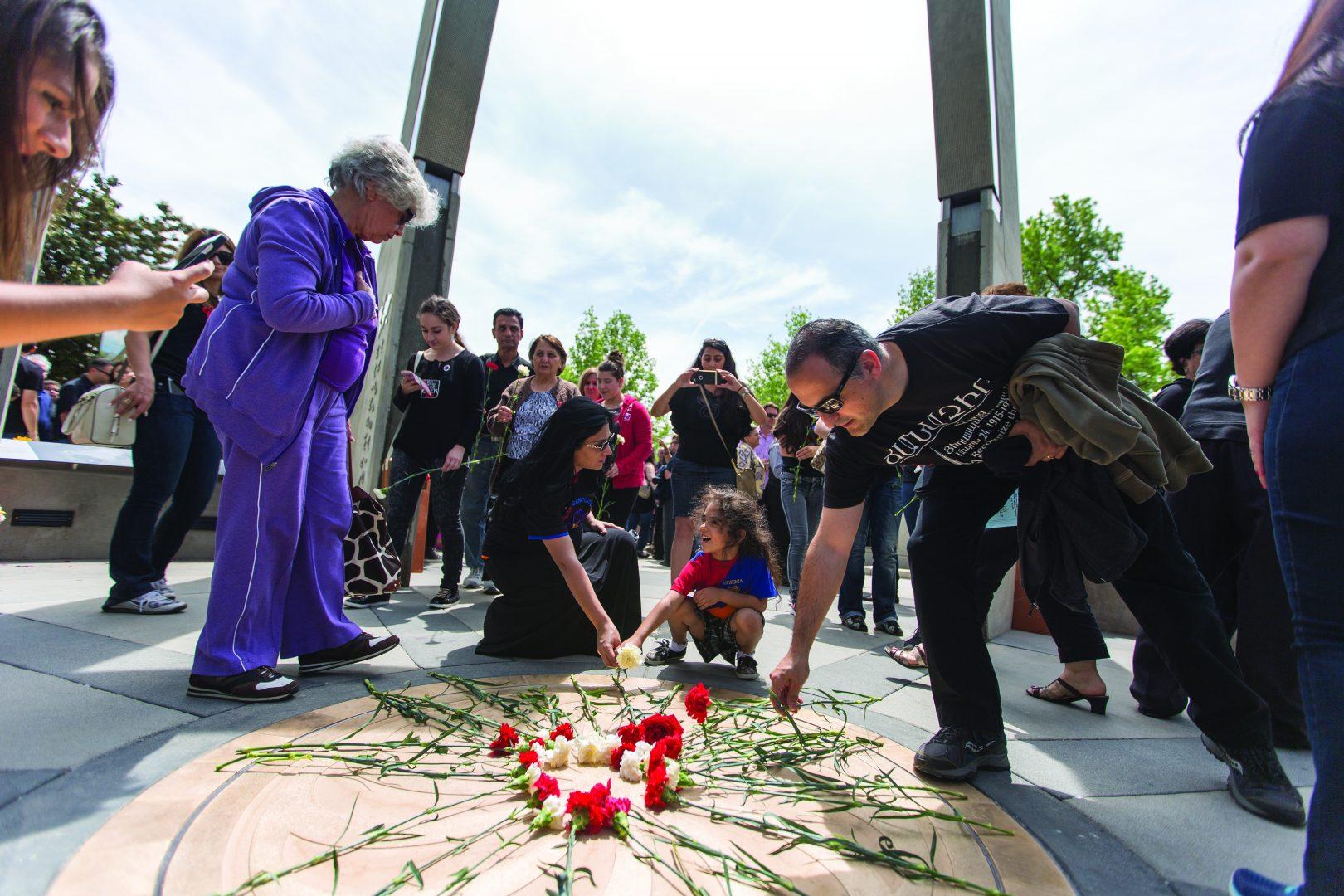Community members came together Friday to commemorate the centennial of the Armenian Genocide during a ceremony at the recently unveiled Armenian Genocide Monument at Fresno State.
“Bells of Peace” rang across campus from the carillon in the University Student Union clock tower for 15 minutes to represent the year 1915.
“I think that anyone who was here Thursday night will attest to the fact that this year has been an extraordinary year in the life of Armenians both here in the Fresno area and throughout the world,” said Barlow Der Mugrdechian, a professor in the Armenian Studies Program.
Der Mugrdechian said that Fresno State was an appropriate site for the genocide monument because of its location and relation to students, where many could learn about the Armenian Genocide.
“The purpose of the monument was to commemorate, to educate and to inspire,” Der Mugrdechian said.
Der Mugrdechian said he hopes future generations in the Valley will visit the monument to recognize and remember the genocide.
“Today, this is a blessed place,” he said. “It’s a space where people can come and to contemplate about what has happened, and also to think about what is to happen in the future.”
Marine Vardanyan, president of the Armenian Students Organization, thanked everyone involved in planning the commemoration and for the community for coming out and showing support to honor the estimated 1.5 million Armenians who perished in the genocide.
“Today is a solemn occasion as we mark the 100th anniversary of the genocide,” Vardanyan said. “…By denying history, by dismissing a crime of such magnitude, they are setting the path for the recurrence of similar atrocities.”
Vardanyan thanked Associated Students, Inc. for passing a resolution at a recent senate meeting recognizing the genocide and declaring Friday — along with University President Joseph Castro, who was in attendance — as “Armenian Remembrance Day.”
“As you can see I am not Armenian, but I am a Sikh,” said Kiran Dhanjan, ASI vice president for external affairs. “And we had a genocide 31 years ago and I can feel the same pain as to what that means.”
Fresno State senior Megi Hakobjanyan read a memoir from her great grandmother recanting of her story of trying to escape attacks from ethnic Kurds — who were also involved with the genocide alongside the Turks.
“Years later, she purposely hid the horrific details from her children except for one gruesome image of the River Arax,” she said. “Arax water ran red with the bodies of the dead. She held her sister’s hand and they ran over the bodies to get to the shore.”
A minute of silence was held in remembrance for the millions killed in the genocide before Castro spoke.
“I can think of no other university campus where this would be more fitting than it is to have a monument, an Armenian Genocide Monument, here at Fresno State,” Castro said.
Castro said he’s received messages of support from people across the world.
The president teared up when he shared an experience he had in Los Angeles a few nights ago. He had been approached by a leader from the Little Armenia and Hollywood neighborhoods after finishing a meeting at a hotel. The community leader gave him a certificate in honor of the school building the genocide monument.
“He wanted me to let all of you know that that entire community stands with us and stands with the Armenian communities all around the world,” Castro said.
Business professor Arakel Arisian spoke about embracing Armenian culture and sharing it with others through language, art, food and religion.
“These are the ingredients of our rebirth as a people,” Arisian said.
Arisian, a former Fresno State student who served as ASO president, recalled working with Der Mugrdechian to erect a makeshift copy of the Armenian Genocide Memorial every April 24 in the Free Speech Area.
“Today, 15 years later, we stand proudly before this new monument, a permanent fixture of this campus where so many have and will learn about the Armenians and the genocide,” Arisian said. “I call this progress.”
Arisian said that it was the job of Armenians to remember the past and celebrate their rebirth.
“We’re not only challenged to never forget, but also to forgive those who persecuted us, and in doing so, we will be able to move forward as a people, strengthened by our struggles,” he said.




